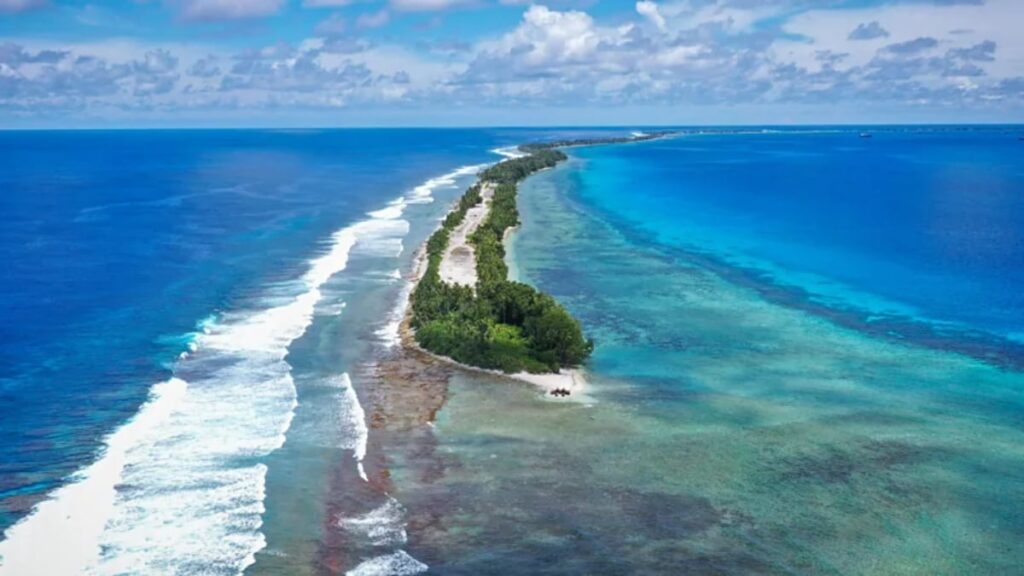Tuvalu: Adapting to Climate Change on the Metaverse – Firstpost

Tuvalu, a small country in the Pacific Ocean made up of nine coral islands, is facing the threat of disappearing due to climate change.
As reported by the BBC, rising sea levels are eroding its shores, prompting the government to take drastic measures to protect its land and heritage by creating a digital replica of everything from houses to trees in an effort to salvage what they can.
With the physical land sinking beneath the waves, Tuvalu is constructing a virtual duplicate to preserve not only the nation’s beauty but also the legal rights of its 11,000 citizens for future generations.
Foreign Minister Simon Kofe announced the initiative, part of Tuvalu’s “Future Now” project, at COP27 in 2022. The project combines diplomacy and climate adaptation, with Kofe unveiling the virtual replica in a captivating video showcasing the transformation of Te Afualiku, a small island expected to be the first casualty of rising sea levels.
This digital twin is intended to safeguard the country’s assets, including its land, ocean, and culture, by moving them to the cloud, as noted by Kofe in the video.
Aside from creating a virtual landscape of Tuvalu, the ‘Digital Nation’ project also aims to preserve the cultural heritage of the island nation by digitizing personal memories, stories, and traditions submitted by citizens to create an archive embodying the nation’s essence, as described by Foreign Minister Simon Kofe in 2023.
In addition to addressing the practical need to protect sovereignty amid the threat of rising sea levels, Tuvalu is exploring the use of blockchain technology to create digital passports, facilitating functions such as elections and civil registrations in a digital environment.
The initiative has received support from other nations facing similar challenges but has faced skepticism, including within Tuvalu’s own government.
While some critics view the project as emblematic of the resource-intensive systems fueling climate change, others acknowledge it as a response to the inevitable reality of displacement as conditions on the islands become increasingly untenable.
Scientific assessments indicate that much of Tuvalu’s land, including critical infrastructure, will be submerged by high tide levels by 2050. The country is projected to experience over 100 days of flooding annually by the end of the century, along with other adverse effects like saltwater intrusion, heatwaves, and intensified cyclones.
Exceeding a 1.5°C global temperature rise poses a significant threat to small island nations like Tuvalu, with global temperatures surpassing this threshold over an entire year from February 2023 to January 2024.
While Tuvaluans grapple with the reality of relocation amid climate change, the creation of a digital twin offers a means for the diaspora to stay connected to their heritage and homeland. This shift represents a departure from the Pacific Islands’ slogan “we are not drowning, we are fighting.”
Reality of Relocation
In response to climate change, Tuvaluans are already contending with relocation, with a treaty between Tuvalu and Australia allowing for the annual migration of 280 Tuvaluans, providing new visas for work, study, and potential citizenship opportunities.
However, there are differing views within Tuvalu on the necessity of abandoning the islands. Former prime minister Enele Sopoaga, now the opposition leader, believes there is no legal basis to support the proposition that Tuvalu will disappear due to sea level rise.
Tuvaluan climate activist Grace Malie asserts that Tuvalu and other ocean states will continue to fight for their land, culture, and future in the face of rising sea levels and existential threats, emphasizing the importance of preserving their dignity, heritage, and culture.
While some Tuvaluans consider migrating to Australia, efforts are underway to compel Australia to reduce fossil fuel extraction and exports. Additionally, there are arguments in favor of creating a digital twin of Tuvalu without abandoning the physical islands, emphasizing the importance of protecting both.
‘Digital Nation’ Plan Impractical
Critics contend that the ‘Digital Nation’ plan is impractical for a country that is still relatively disconnected from the digital world, suggesting it may be a strategic move to attract international attention and pressure wealthier nations to reduce emissions. However, the efforts by the Tuvaluan government to map its islands and enhance connectivity indicate a commitment beyond mere diplomacy.
Following the COP27 announcement, Tuvalu conducted a 3D scan of all its islands and islets using Lidar technology, with plans to build an undersea telecommunications cable to enhance digital connectivity. Global non-profit Place has also begun mapping Tuvalu’s capital, Funafuti, using drones and cameras to create a detailed digital representation of the islands.
Source link
#Pacifics #sinking #island #nation #Tuvalu #recreating #metaverse #Firstpost





